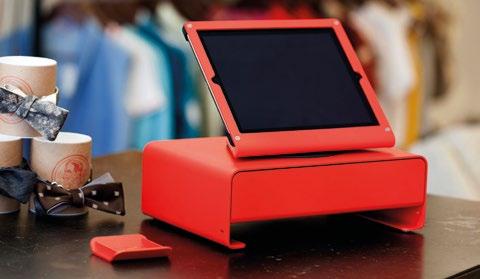
4 minute read
How to help clients choose
How to help clients choose the best till system for their business
@TheGoodTillco
Oliver Rowbory, Co-Founder, The
Good Till Co.
The Good Till Co. is a cloudbased POS system that gives independent retailers, bars and cafes access to powerful data intelligence.
When it comes to setting up or running a business, the number of decisions and choices your clients will make on a daily basis can be overwhelming. They will no doubt be talking to suppliers, selecting and sampling products and working with staff while juggling a hundred and one other tasks. The till system they will use probably feels like a minor concern to them, one that sits somewhere towards the bottom of their priority list as long as it is working...
The reality is, however, that
the technology behind till systems has moved on hugely in recent years. The amount and variety of choice for EPOS systems can be quite daunting, but it is a vital decision for both their business and how they work with their accountants.
So how can you help your clients to decide what will really be the best fit for their business? Here are a few things to think about when helping them make their choice.
Consider the clients’ long-term needs
For many years, a ‘till’ was little more than a cash drawer and a calculator. However, in today’s digital world, an EPOS system can become the beating heart of a business. A till system can now pull in and use data in a way that allows users to manage stock and staff, understand and engage customers better, manage tables and food orders, make smarter business decisions and even integrate with accountancy platforms like Xero to improve efficiency and accuracy. Choosing an EPOS should be about more than just taking payments from customers, so it is important to think about the needs of the business both today and in the future.
Choose a merchant service partner
From the wide range available, choose the option and cost level that best suits the business. A major bespoke system will be a significant investment; an offthe-shelf till might cost a couple of thousand pounds as a one-off payment; or your client might prefer to spread the cost, choosing from the new breed of cloud-based systems that are more flexible and work on a monthly subscription model.
The ability to choose payment types
Since the rise of digital technology, convenience has become the new loyalty. The key thing an EPOS should do is remove any barriers from the customer journey, making buying as simple and convenient as possible. The more contactless and mobile payments are promoted by major retailers like supermarkets and high street giants, the more customer expectations shift. Being able to take payments in this way will quickly become the expected standard, so don’t allow your clients’ business to get left behind.
Consider connectivity
The ‘cloud’ has revolutionised the way lots of businesses work, providing a platform to collect, analyse and use huge amounts of business data quickly and securely. Businesses in rural areas may hesitate to use new cloud technologies because of unreliable or slow broadband connection, but don’t be discouraged – there are solutions that allow companies to work offline and then sync to the cloud once there is a stable internet connection available.
Think about the staff
In today’s increasingly anonymous digital world, genuine human interaction is scarcer than ever before. This only makes a human connection more valuable, so it pays to use the technology and data behind the till system to automate data-driven tasks, and free up the amount of people in the team to add value through their human emotion and creativity.
one of the most valuable assets in a business, it is crucial that any technology introduced is as simple and intuitive as possible. The business till system is there to make lives easy, but with the right data points, it can also help you look at whether the ratio of staff to activity right at different times, how staff are working or even who your best salesperson is.
Consider the cost
The latest wave of POS technology is actually more accessible to smaller businesses than many people imagine.
Traditional till systems range from simple off-the-shelf options up to state-of-the-art bespoke a large initial outlay, and this can run into thousands of pounds. The development of cloud-based POS systems has revolutionised the industry because data can be collected, processed and stored securely on a remote server. This means systems can run via a device like an iPad, making them much more flexible and cheaper to support. With many providers offering free trials, supporting a single till unit can cost little more
systems, but both often require than £1 per week. The software is intuitive to users, and the hardware looks pretty cool to customers too!
Future-proof the system
Using new technologies and agile hardware will give increased flexibility to make changes to the way of working in future. A tabletbased POS system is intuitive to use and completely flexible, so a business can have a system customised to its requirements rather than being restricted by set
hardware solutions. The most important factor in future-proofing the EPOS solution, however, is ensuring that it gives you the ability to gather and use data intelligently. By integrating Xero, you and your client can access real-time reporting of exactly what is selling, who is making the sales, and keep on top of cash flow, so continually optimising the business and calculating expenses can become second nature. In addition, the data collected provides the opportunity to keep communicating customers and to build a longerterm relationship.










